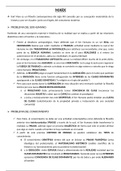Abortion:
Statistics on Abortion:
• In 2018, there were 200,608 abortions for women resident in England and Wales.
• 4,687 abortions of non-residents (mainly from Ireland and Northern Ireland).
• 98% funded by the NHS (although 72% took place in independent sector)
• 90% carried out before 13 weeks gestation; 80% before 10 weeks.
• 0.6% of abortions were to girls under the age of 16. highest abortion rate = women aged 21.
• Seeing an increasing number of abortions of 35 and over
Different Views
- Strong view against abortion isn’t okay [but usually, never an absolute view. If the mother is in danger or
circumstances are different, then many in this camp may concede to allowing an abortion]
- Another extreme end some going up to the day before the baby is born
Ethics of Abortion:
1. The moral status of a foetus
o View that a foetus is a human, so can’t kill a human
This argument is contingent on when the foetus becomes a person there are different views
2. The self-determination of the mother
o Pregnancy as hugely physically invasive, so question of what level of self-sacrifice is reasonable to expect from
the mother
3. A compromise position: abortion subject to restrictions in most legislation
The Moral Status of an Embryo:
- WHEN DOES PERSONHOOD COMMENCE?
o Conception
A human automatically
Finnis there’s no other definite moment like this one. Should be cautious.
Criticism not a point in time etc
o 14 days
Warnock approach
In practice, would rule out all abortions
o Sentience
When foetus is self-aware and can feel pain
We think it can happen from 20-27 weeks
Self-awareness distinguishing humans from non-humans
Links to when we think life ends brain death.
But, we have those who are brain dead and are still considered humans.
If we define personhood based off of self-awareness, would undermine this camp of people
Why does self-awareness make something more or less valuable?
o Viability
Point at which the foetus can be kept alive outside the womb with some chance of survival.
Earliest = 22 weeks. We generally think it is at 24 weeks.
Foetus is separable from the mother so makes sense to think of it independently
Difficulty:
The time at which a foetus can be kept outside the womb is dependent on medical
advancements
o Consequence= in some countries like England, you’re a person at 24 weeks [because
we have the technology to do so], but in others like Ethiopia, you’re not a human.
o Not a straight line in the sand like it seems like
Even in England, higher chance in GOSH than in other hospitals in the UK
Practically, you’re just swapping one form of dependence for another
Need invasive medical treatment to keep alive so is this really a morally significant point?
o Birth
Legally, this is when we see it as a human
Line in the sand easy to provide rights
Criticism:
It’s just a matter of geography
o An hour before birth, not a person with rights, but the second they’re born, they have
all the rights.
Some argue against birth isn’t just a matter of geography, it is a major biological event that
changes behaviour
Just because we give legal rights at the point of birth, doesn’t mean that the foetus doesn’t have legal
interests prior to birth
We still recognise it as something valuable that we should give a greater standing to this is
reflected in the law on abortion due to restrictions disallowing an abortion after 24 weeks
, o Some time after birth because new-borns aren’t rational or self-conscious [features of personhood], might say
that they aren’t persons
Problems:
If we impose this as the standard, we are cutting out a lot of people who don’t have rationality
or consciousness [disabled people]
o Might make infanticide legal
Alternative approaches: Avoiding the difficulties
1. Not a person but a potential person so should value it.
2. Depriving the foetus of value they may have in the future and it is wrong to do this
3. Gradualist approach
o Not a single point in time, but as the foetus develops, it gets closer and closer to personhood
4. Risk averse approach
o Given that we will never know when a foetus becomes a person, we don’t want to make the mistake of killing a
person by accident, so shouldn’t allow abortion at all.
A Mother’s Right to Self-Determination:
• Even if a foetus is a ‘person’, should women have to accept their bodily integrity being invaded for 9 months?
• A woman should be able to defend herself against any bodily invasion, so even if the foetus is a person, this
includes them too
• Judith Jarvis Thomspon argument: in law, we generally do not expect people to have to help others. There is no duty
to do this. With that in mind, why should a woman support a foetus if she doesn’t want to? Violinist example: attached to
a violinist randomly, who needs you connected to him otherwise he’ll die. Will you be entitled to disconnect yourself?
No one would expect you have to stay is it incumbent on you not to unplug the violinist?
• BUT: you’re not responsible for becoming attached to the violinist [you were forced], but in pregnancy, it is
often something the woman is responsible for
• Some say that this analogy doesn’t work in that you’re not just unplugging yourself, you’re killing a foetus.
Pregnancy Birth
• Back pain • Pain
• Morning sickness • Complications from epidural
• Fatigue • Bleeding
• Constipation • Tearing and episiotomy
• Hemorrhoids • Emergency caesarean section
• Abdominal separation • Nerve damage
• Pelvic girdle pain (PGP) • Infection
• Deep vein thrombosis. • Psychological trauma
• Hypertension disorders • Death
A Compromise Position:
• Foetus has the potential to be a person so should be given some protection, but women also have a right to self-
determination
• = abortion permissible but only in certain circumstances.
Not Just Ethics!
- Public health issue
o Why we have the Abortion Act:
Concerns about backstreet abortions. Using coat-hangers and bleach to try to force a miscarriage. Many
deaths are due to unsafe abortions.
- Political issue
o US= polarising issue. Roe v Wade
- Equality issue
o Impacts women more than men impacts their entire lives
Offences Against the Person Act 1861:
- Section 58
o Every woman, being with child, who, with intent to procure her own miscarriage, shall unlawfully administer to
herself any poison or other noxious thing, or shall unlawfully use any instrument or other means whatsoever
with the like intent, and whosoever, with intent to procure her miscarriage, whether she be or be not with child,
shall unlawfully administer to her or cause to be taken by her any poison or other noxious thing, or shall
unlawfully use any instrument or other means whatsoever with the like intent, shall be guilty of felony.
Maximum sentence of life imprisonment
- Section 59
o Whosoever shall unlawfully supply or procure any poison or other noxious thing , or any instrument of thing
whatsover, knowing that the same is intended to be unlawfully used or employed with intent to procure the
miscarriage of any woman, whether she be or be not with child, shall be guilty of a misdemeanour
, The use of the poison must be unlawful
Is there a way of doing it lawfully?
R v Bourne [1938] 3 ALL ER 615,
- Facts:
o Considered this question of whether it can ever be lawful to induce a miscarriage
o An abortion was done on a 14 year old girl who had been violently raped
In court, he [doctor] said that he didn’t consider it to be unlawful as he felt that the continuation of the
pregnancy would’ve caused a risk to the girl’s mental health.
- MacNaughten J: [accepts the doctor’s POV]
o If the doctor is of the opinion, on reasonable grounds and with adequate knowledge, that the probable
consequence of the continuance of the pregnancy will be to make the woman a physical or mental wreck, the
jury are entitled to take the view that the doctor is operating for the purpose of preserving the life of the mother.
o … You will remember that the defendant said that if he had found that this girl was feebleminded or had what
he called a "prostitute mind" he would not have performed the operation, because in such a case the pregnancy
would not have affected her mind. But in the case of a normal, decent girl brought up in a normal, decent way
you may well think that Dr. Rees was not overstating the effect of the continuance of the pregnancy when he
said that it would be likely to make her a mental wreck, with all the disastrous consequences that would follow
from that.
Would the same decision have been met if the girl wasn’t a 14-year-old who had been violently raped?
What if it was someone who didn’t secure as much sympathy?
- FOUND:
o An abortion could be done lawfully if the continuation of the pregnancy would’ve damaged the mother either
physically or mentally had profound consequences in practice.
The Position Pre-1967
- For the liberal doctors who didn’t need to see clear evidence of the damage to the mother, they were able to charge really
high fees to the women who wanted abortions
o It excluded a huge group of women who couldn’t afford these doctors they had to go back to backstreet
abortions
- 80,000-100,000 illegal abortions per year
o High mortality rates
o Prosecutions rare
= Abortion reform seen as a public health measure Act does not give women the right to an
abortion!
Actually, the Act attempting to move away from abortions being done unhygienically,
unsafely etc. Wanted to medicalise the issue.
Abortion Act 1967:
- Does not repeal s58/59 OAP Act 1861
- BUT abortion will be lawful if the criteria laid out in the Act are met. [an exception so s58/59]
- These require that:
o Two doctors must agree that woman meets one of the statutory grounds for abortion
o Abortion conducted by registered medical practitioner in approved place
o All abortions are notified to the Chief Medical Officer.
Statutory Grounds for Abortion:
- S1(1): No offence if medical practitioners are of the opinion that:
o [a] That the pregnancy has not exceeded its twenty fourth week [time limit since 1990] and that the continuation
of the pregnancy would involve risk, greater than if the pregnancy were terminated, of injury to the physical or
mental health of the pregnant woman or any existing children of her family; or …
o [b] That the termination is necessary to prevent grave permanent injury to the physical or mental health of the
pregnant woman; or
[a] applies to abortions being done up to 24 weeks, [b] [c] and [d] apply to abortions post 24 weeks
o (c) that the continuance of the pregnancy would involve risk to the life of the pregnant woman, greater than if
the pregnancy were terminated; or
o (d) that there is a substantial risk that if the child were born it would suffer from physical or mental
abnormalities as to be seriously handicapped
[d]= more controversial
Can go to jail if you attempt to commit an abortion in a way that does not fall under this Act
Two Doctor Requirement:
- Women’s access to abortion contingent on the approval of two doctors [who, on good faith, have to find that the one of
the grounds was fulfilled]
o Principled objection why should women’s decisions be scrutinised and approved by a doctor
Inherently paternalistic?
o Pragmatic objection slows down access to abortion might be a problem if you’re nearing 24 weeks
The later on in the pregnancy it gets, the fewer doctors who would be willing to approve a circle












